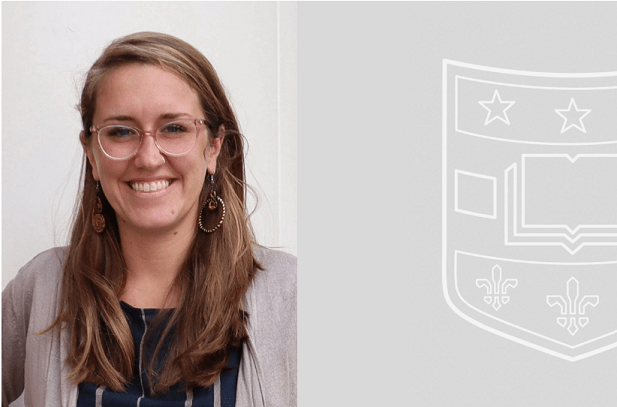Lindsey M. Filiatreau, PhD, MPH is an assistant professor in the Division of Infectious Diseases at Washington University School of Medicine in St. Louis. She is a member of the Washington University Network for Dissemination and Implementation Research (WUNDIR) and has been a methodology presenter, discussing how researchers can better understand context while planning for the implementation and scale-up of evidence-based interventions. She has conducted extensive research in HIV prevention, treatment and care. Learn more about Filiatreau’s work in the following Q&A and why she is in our September Collaborator SPOTLIGHT!

What stands out as your most important project and why?
Currently, I am supporting the Uhambo Lwami study in KwaZulu-Natal Province, South Africa, which aims to track and trace individuals living with HIV who have demonstrated unstable engagement in care. The overarching goal of this work is to better understand true patient outcomes and HIV care trajectories across the province. Through a pilot study, we found that more than a quarter of the individuals involved had experienced thoughts of self-harm or suicidal ideation in the past two weeks. Nearly half were exhibiting symptoms of moderate to severe depression. Coupled with the severely limited access to formal mental health care services in KwaZulu-Natal, and in the country more broadly, these data have inspired and informed my latest grant application. With this funding, we would leverage community-engaged research methods to design and pilot test a stepped-approach to mental health care delivery for people living with comorbid HIV and depression. I am passionate about this project because it centers on needs of both patients and providers to address the urgent mental health treatment gap in a contextually feasible manner. In addition, it affords us the opportunity to continue working with and learning from a brilliant team of investigators at the Human Sciences Research Council in South Africa, who are deeply embedded in and committed to their community.
Are there other projects you are passionate about?
I am an epidemiologist by training (Go Heels!) and came to the field of dissemination and implementation science to fill important gaps in my expertise related to closing the “evidence-to-practice gap”. Put more simply, I wanted to develop the skills to increase access to and uptake of evidence-based interventions, particularly for people living with HIV in under-resourced settings. In diving into the dissemination and implementation literature, I have been both surprised and excited by the opportunity to leverage causal epidemiologic methods to solve prominent challenges facing the comparatively young field of implementation science.
Currently, I am working with Drs. Aaloke Mody, Charles Goss, Elvin Geng and Byron Powell on formalizing an approach that uses Directed Acyclic Graphs. These are robust epidemiologic tools used to specify causal relationships between variables so we canbetter understand under which circumstances (e.g., where, when) it is appropriate to scale evidence-based interventions and implementation strategies. For example, if provider incentives are shown to increase the likelihood of screening for sexually transmitted infections in rural clinics in KwaZulu-Natal Province, South Africa, would we expect similarly promising results if we offered incentives to clinicians in emergency departments across New York City?
These methods can also be used to inform what measurements are most important to capture if researchers, policy or program implementers are interested in using an evidence-based intervention or implementation strategy in another context. Using the prior example, it might be important to consider the underlying prevalence of sexually transmitted infections in both KwaZulu-Natal Province and New York and the degree of competing priorities among both sets of providers.
Though more theoretical in nature, I think this work will have important implications for the efficient and effective scale-up of evidence-based interventions and implementation strategies- something I am deeply passionate about.
How has your collaboration with the Center for Dissemination & Implementation benefitted your research?
This past spring, I had a one-on-one consult with Dr. Daniel Almirall during his visit to WashU to present at the Center for Dissemination & Implementation Seminar Series on Multi-level Adaptive Implementation Strategies (MAISYs). We discussed my plans for the above-mentioned award aimed at benefitting people living with comorbid HIV and depression in South Africa. Dr. Almirall was very helpful in refining my thinking about complex study design issues related to this work, and has since become an advisor on the grant application. I am delighted to have the opportunity to continue learning from and working with Dr. Almirall—an outcome facilitated entirely by the Center for Dissemination & Implementation.
In addition, I attended the center’s D&I Proposal Bootcamp in fall of 2022 to seek feedback from more senior colleagues on my award application. This event was an excellent opportunity to network with colleagues working at the forefront of D&I science and provided helpful guidance in refining the scope of my grant.
How can the Center for Dissemination and Implementation benefit other researchers?
For me, as a new faculty member in WashU’s School of Medicine, the center has facilitated the growth of not only my professional network, but a broader level of scientific thinking, more specifically as it relates to the scale-up of evidence-based interventions for people living with HIV in under-resourced settings. The center is committed to facilitating faculty member’s growth at all career stages and creates opportunities to build collaboration and community with fellow colleagues working or interested in D&I science. After struggling to find my footing during my postdoctoral training, this has made a world of difference in my feeling settled in my current role and direction. I firmly believe increased collaboration and communication among community members, program implementers, policy-makers, and researchers working across a range of both scientific and applied disciplines is a key component in closing the evidence-to-practice gap. While the journey ahead remains long, I believe the Center for Dissemination and Implementation values this fact and works hard to provide opportunities to facilitate these types of interactions.